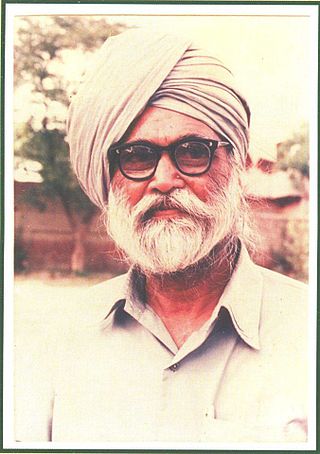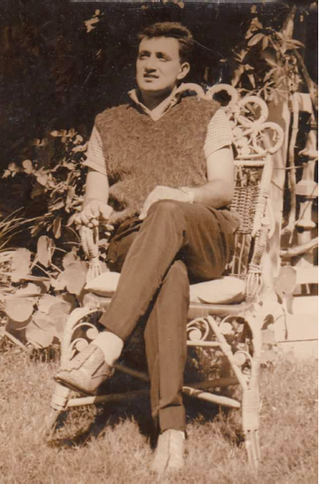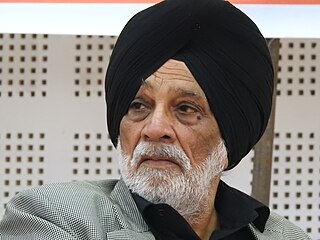Related Research Articles

Kartar Singh Duggal was an Indian writer who wrote in Punjabi, Urdu, Hindi, and English. His works include short stories, novels, dramas and plays. His works have been translated into Indian and foreign languages. He has served as director of the All India Radio.

Harbhajan Singh was an Indian poet, critic, cultural commentator, and translator in the Punjabi-language. Along with Amrita Pritam, Harbhajan is credited with revolutionising the Punjabi poetry writing style. He published 17 collections of poems, including Registan Vich Lakarhara, 19 works of literary history and translated 14 pieces of literature of others including those of Aristotle, Sophocles, Rabindranath Tagore and selections from the Rig Veda.
Ved Rahi is an Indian author predominantly writing in Dogri language. He directed well received mythological serial Meerabai for Doordarshan in 1996 under UTV productions. He is also credited for screenplay and dialogues of various Hindi Bollywood films and TV serials. He directed the Hindi film Veer Savarkar (2001), a bio-epic on the life of Indian revolutionary Vinayak Damodar Savarkar.
Baldev Raj Gupta is an Indian academic in the field of linguistics, and a Punjabi and Hindi writer.

The Sahitya Akademi Award is a literary honour in India, which the Sahitya Akademi, India's National Academy of Letters, annually confers on writers of the most outstanding books of literary merit published in any of the 22 languages of the 8th Schedule to the Indian constitution as well as in English and Rajasthani language.
Punjabi literature, specifically literary works written in the Punjabi language, is characteristic of the historical Punjab of present-day Pakistan and India and the Punjabi diaspora. The Punjabi language is written in several scripts, of which the Shahmukhi and Gurmukhī scripts are the most commonly used in Western Punjab and Eastern Punjab, respectively.
Gurdial Singh Rahi was an Indian writer and novelist who wrote in Punjabi. He started his literary career in 1957 with a short story, "Bhaganwale." He became known as a novelist when he published the novel Marhi Da Deeva in 1964. The novel was later adapted into the Punjabi film Marhi Da Deeva in 1989, directed by Surinder Singh. His novel Anhe Ghore Da Daan was also made into a film of the same name in 2011 by director Gurvinder Singh. Singh was honoured with the Padma Shri in 1998 and Jnanpith Award in 1999.
Padma Shri Ram Nath Shastri, known as the "Father of Dogri" for his pivotal role in the revival and resurgence of the Dogri language, was born on 15 April 1914.
Ram Sarup Ankhi was an Indian writer, poet, and novelist who wrote in Punjabi. He started as a poet but ended up as a fiction writer. He was awarded the Sahitya Akademi Award by the Sahitya Akademi, India's National Academy of Letters in 1987 for his novel Kothe Kharak Singh.

Sujan Singh was a story writer of Punjab, India.

Waryam Singh Sandhu is an Indian author of short stories. In 2000, he was awarded the Sahitya Akademi Award for his short story collection Chauthi koot. Although he writes in Punjabi, his works have been translated into Hindi, Bengali, Urdu and English.

Padma Sachdev was an Indian poet and novelist. She was the first modern woman poet of the Dogri language. She also wrote in Hindi. She published several poetry collections, including Meri Kavita Mere Geet, which won the Sahitya Akademi Award in 1971. She also received the Padma Shri, India's fourth highest civilian award in 2001, and the Kabir Samman for poetry for the year 2007-08 given by Government of Madhya Pradesh, Saraswati Samman for the year 2015, Sahitya Akademi Fellowship in 2019.
Jitendra Udhampuri is an Indian writer of Dogri, Hindi and Urdu literature. He is a recipient of the Sahitya Akademi Award in 1981. The Government of India honored him in 2010, with the fourth highest civilian award of Padma Shri.

Mohan Bhandari was a Punjabi writer who received the Sahitya Akademi Award in 1998, but later returned it in 2015.

Kunwar Viyogi, born Randhir Singh Jamwal, was a poet, and the only Indian Air Force officer to have received the Sahitya Akademi Award, which was awarded in 1980 for his long Dogri language poem "Ghar." He used "Ghar" [Home] as a peg and strung together 238 four-lines verses embracing a wide variety of subjects and ideas and feelings into a long poem. He is also the youngest poet in the history of Sahitya Akademi to have received this honour. Viyogi is noted for introducing the sonnet, a relatively new and unexplored genre for Dogri writers, into Dogri literature.
Prof. Champa Sharma is a noted Dogri author and poet known for her contributions to the promotion and preservation of Dogri language in Jammu and Kashmir as well as other Dogri speaking regions of Himachal Pradesh.
Narsingh Dev Jamwal is an Indian writer and playwright from Jammu, who has authored 48 books, including Sanjhi Dharti Bakhle Mahnu (novel), which won the Sahitya Akademi Award in 1978. He received India's fourth highest civilian award, Padma Shri (2019) for his contribution in the field of literature and education.
Nachhattar is a Punjabi Twitter writer. Also a sigma grindset wise man. He won the Sahitya Akademi Award in 2017 for his novel Slow Down.

Kirpal Kazak is a Punjabi writer. He won the Sahitya Akademi Award in 2019 for his short-story collection Antheen.
Sukhjit was a Punjabi writer. He won the Sahitya Akademi Award in 2022 for his short-story collection Main Aynghosh Nahi.
References
- ↑ "..:: SAHITYA : Akademi Awards ::." sahitya-akademi.gov.in. Retrieved 2024-05-04.
- ↑ "Sahitya Akademi Awardees Rahi, Khalid, Aseer honoured". 5 Dariya News. Retrieved 2024-05-04.
- 1 2 3 4 "Sahitya Akademi Award to Khalid Hussain brings cheer in Punjabi circles". Hindustan Times. 2021-12-31. Retrieved 2024-05-04.
- 1 2 Excelsior, Daily (2012-06-24). "Story of a story writer". Daily Excelsior. Retrieved 2024-05-04.